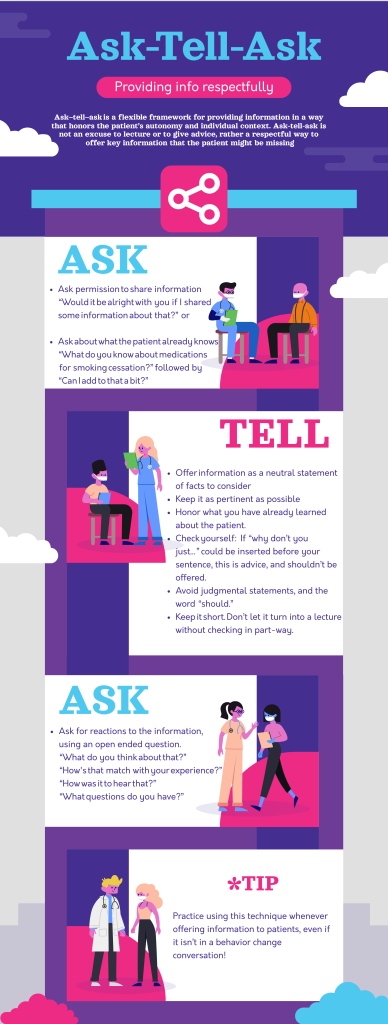Providing Information Respectfully
Unsolicited advice often leads to resistance and impairs rapport. But patients do need accurate information to guide their choices about change. How can we provide information in a way that doesn’t feel like unsolicited advice?
Ask–tell–ask is a flexible framework for providing information in a way that honors the patient’s autonomy and individual context. Ask-tell-ask is not an excuse to lecture or to give advice, rather a respectful way to offer key information that the patient might be missing.
ASK:
- Ask permission to share information “Would it be alright with you if I shared some information about that?” or
- Ask about what the patient already knows “What do you know about medications for smoking cessation?” followed by “Can I add to that a bit?”
TELL:
- Offer information. The “tell” should be a neutral statement of facts for the patient to consider. Keep it as pertinent as possible, honoring what you have already learned about the patient. “You‘ve put a lot of thought into protecting your kids from your smoking. We do know that even when a parent smokes outside, children experience more ear infections and asthma exacerbations.”
- Check yourself. If “why don’t you just…” could be inserted before your sentence, this is advice, and shouldn’t be offered. Avoid judgmental statements, and the word “should.”
- Keep it short. Don’t let it turn into a lecture without checking in part-way.
ASK:
- Ask for reactions to the information, using an open ended question. “What do you think about that?” “How does that match with your experience?“ “How was it to hear that?“ “What questions do you have?”
Tip: Practice using this technique whenever offering information to patients, even if it isn’t in a behavior change conversation! “Is there anything else I should know before we talk about my impressions?” “What do you know about antibiotics for bronchitis?” <give information> “What questions do you have about that?” “How will that work for you?”
“Yeah, but…”
Motivational Interviewing skills are designed to evoke motivation, commitment, and planning from the patient, often expressed in the form of change talk. When we overestimate a patient’s readiness for change or begin to give too much advice, we may notice an increase in sustain talk. By pushing too hard, we’ve put the patient in the position of arguing against change. In MI, this is also called resistance.
If you hear “yeah, but…”, you may be pushing too hard. Rolling with resistance means pivoting to open-ended questions (try pros and cons of the current behavior), neutral reflections (“this just doesn’t feel possible right now”) or affirmations (“you‘ve made a lot of important changes before, I believe you‘ll know when the right time is.”)

